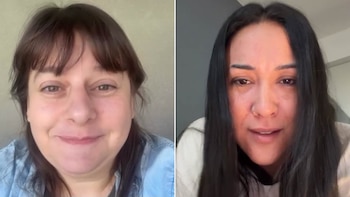
(ATR) The next three months at the United States Olympic Committee will be a clear "transition period" as chairman of the board Larry Probst will step down at the end of the calendar year.
Probst announced his departure today, less than a month after Sarah Hirshland began her tenure as chief executive of the USOC. Independent board member Susanne Lyons will become the next board chair on Jan. 1.
Lyons’ term as a USOC board member was set to expire at the end of the year and Probst said "beyond a doubt she was the ideal person to replace me".
Probst said he will now take the next three and a half months to introduce Lyons to as many people in the Olympic Movement as possible to maintain relationships that he has cultivated in the last 10 years. Probst is an IOC member as a result of leading his National Olympic Committee, and serves on executives in both the Association of National Olympic Committees and Panam Sports.
In September Probst will meet IOC President Thomas Bach to discuss ways he might stay involved in the Olympic Movement. He said he will also discuss his ANOC role with Sheikh Ahmad Al-Fahad Al-Sabah at the IOC Session in Buenos Aires this October.
"I’m not moving to Antarctica, I spent 10 years being involved with the IOC and USOC and I want to stay connected in some way," Probst said.
Probst’s departure is the second high profile exit from the USOC this year. Chief Executive Scott Blackmun stepped down earlier this year as he battles cancer, and was replaced by Hirshland.
Lyons and Hirshland stressed the need for a culture change at the USOC, as the organization continues to navigate the fallout from the Larry Nassar sexual abuse scandal. Probst admitted that "at the top of the food chain," he cannot hide that the USOC failed athletes in the past.
The USOC is currently waiting for a report from the independent investigation by law firm Ropes & Gray into who at the USOC and USA Gymnastics knew what about Nassar’s abuse. Subcommittees from both the U.S. House of Representatives and Senate have been probing U.S. sport organizations about their responses to the Nassar scandal, including the USOC.
"We have said on many occasions that we are sorry for what happened and we have to be laser focused on athlete safety," Probst said. "I’m sure [Lyons and Hirshland] will drive the culture in a positive direction and I could not be happier in the leadership team we are about to put in place."
In one of her first actions as USOC chief executive Hirshland put out a statement questioning the leadership of then President of USA Gymnastics Kerry Perry. Perry resigned her position a few days later, less than a year after assuming leadership of the National Governing Body.
Lyons said that in her role as chair of the board, Hirshland would report to the entire board not her directly. Lyons’ role as chair will be to "ensure that the board has good and meaningful agendas and conversations".
Both executives discussed needing a culture change at the USOC to move the organization forward, with Lyons saying the committee needs to move away from "medals and money as some people have said," towards empowering athletes and making them feel safe.
A new engagement committee will be formed to ensure that athlete and NGB voices are more often heard by the USOC board of directors. That committee will include the head of the Athlete’s Advisory Council, the head of the NGB council, and outside members, Lyons said.
"We are going to be working with the NGBs and with the athletes to talk about [the right support and environment]," Lyons said about approaching a culture change that is not just about money and medals. "We have a finite pool of resources to work with and it has been growing, under Larry’s tenure it has grown to record levels but it is still not enough to go around for everyone to give them exactly what they need.
"So it is finding out what are the key priorities that the athletes feel are the most important, that the NGBs feel are most important, that are most meaningful to helping athletes succeed and being prudent to how we spend these resources and how we allocate them."
Lyons, Probst and Hirshland will all be center stage later this month at the USOC Olympic Assembly in COlorado Springs.
Written by Aaron Bauer
For general comments or questions, click here .
25 Years at # 1: Your best source for news about the Olympics is AroundTheRings.com , for subscribers only.
Últimas Noticias
Utah’s Olympic venues an integral part of the equation as Salt Lake City seeks a Winter Games encore
Utah Olympic Legacy Foundation chief of sport development Luke Bodensteiner says there is a “real urgency to make this happen in 2030”. He discusses the mission of the non-profit organization, the legacy from the 2002 Winter Games and future ambitions.

IOC president tells Olympic Movement “we will again have safe and secure Olympic Games” in Beijing
Thomas Bach, in an open letter on Friday, also thanked stakeholders for their “unprecedented” efforts to make Tokyo 2020 a success despite the pandemic.

Boxing’s place in the Olympics remains in peril as IOC still unhappy with the state of AIBA’s reform efforts
The IOC says issues concerning governance, finance, and refereeing and judging must be sorted out to its satisfaction. AIBA says it’s confident that will happen and the federation will be reinstated.

IOC president details Olympic community efforts to get Afghans out of danger after Taliban return to power
Thomas Bach says the Afghanistan NOC remains under IOC recognition, noting that the current leadership was democratically elected in 2019. But he says the IOC will be monitoring what happens in the future. The story had been revealed on August 31 in an article by Miguel Hernandez in Around the Rings

North Korea suspended by IOC for failing to participate in Tokyo though its athletes could still take part in Beijing 2022
Playbooks for Beijing 2022 will ”most likely” be released in October, according to IOC President Thomas Bach.




